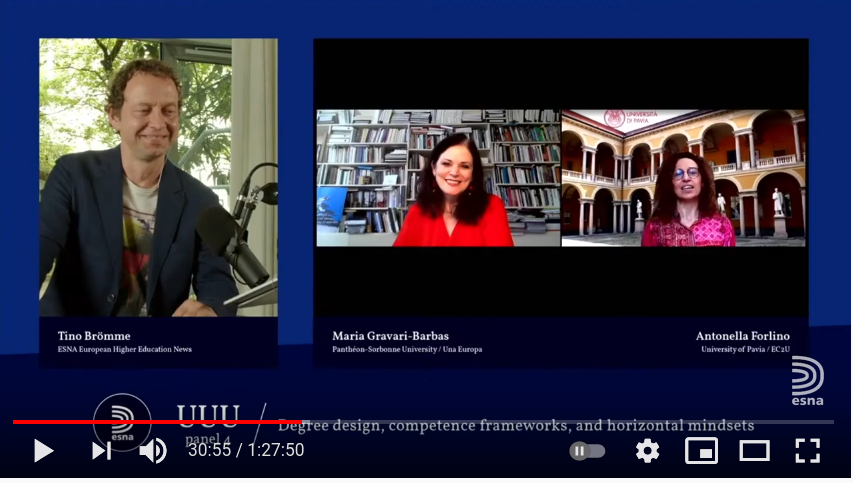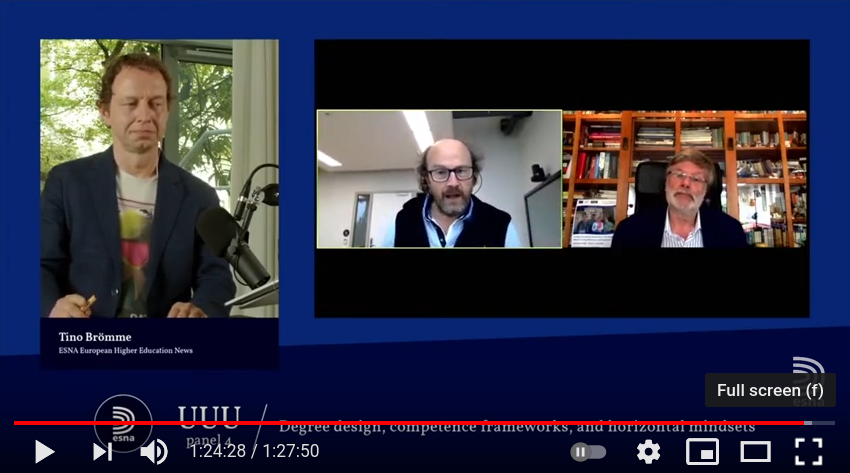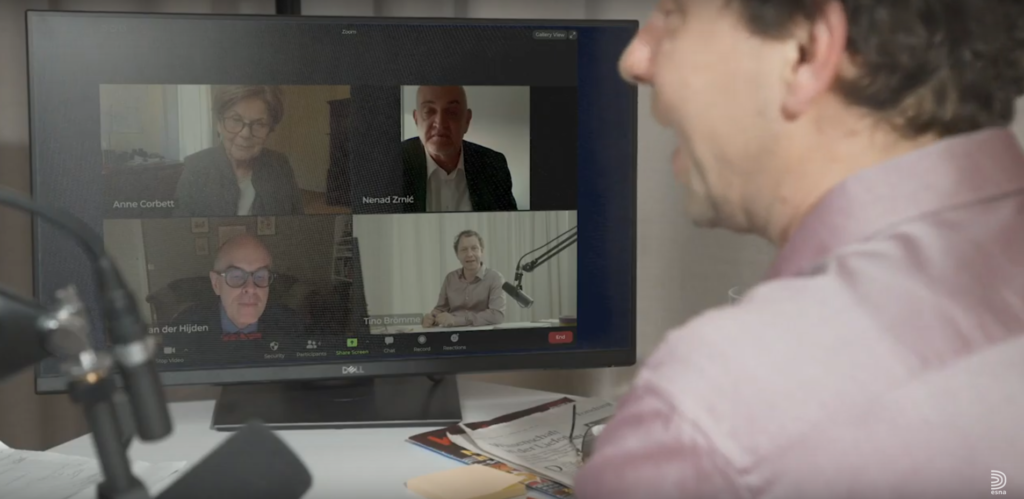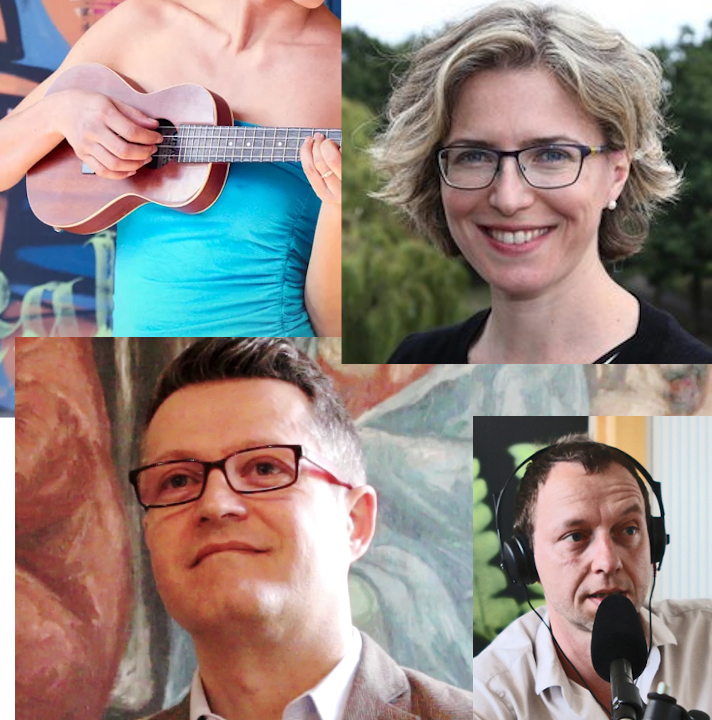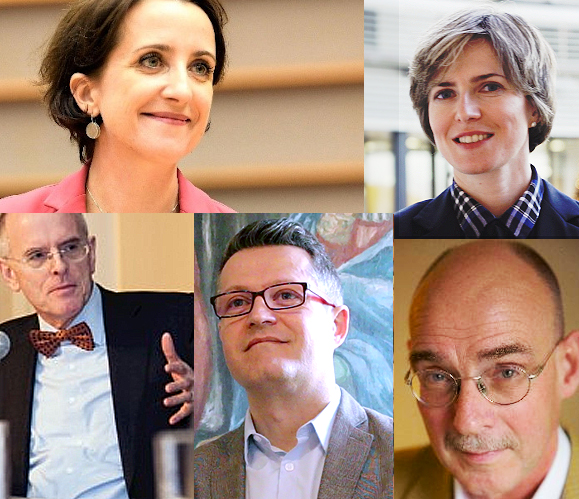Good morning, Europe. Good morning, everybody. Welcome from Zagreb to Moscow, from Istanbul to Brest, welcome to the first public debate on European Universities. I’m very happy that we have this conversation here today at the Berlin Science Week, this is the first of a series that we want to repeat every month with new members of University Alliances.
Let’s start now with Daniela Trani. Welcome to our debate. You know, I’m mostly interested in examples, concrete examples. The YUFE Alliance is a very big alliance of ten universities who came together to work together. What can you do as an alliance that you cannot do alone as Maastricht University?
Daniela Trani Good morning to everyone who’s connected today, although we cannot see each other, hopefully in the next event organised by Tino, this would be possible. And thanks for inviting me to be part of the panel together with Ludovic and Peter. That’s a very interesting question, Tino. There is a lot that you can do as an alliance, which you would not do easily, as a single university. And I would give you an example that has to do with our educational activities. So, of course, the Erasmus programme has allowed our students already for the past phase to study across European countries. But what we are trying to build within YUFE and what we have launched is a pilot activity in July, is a framework where our students can choose their curriculum much more flexibly.
So we put together, for example, our educational offer, our educational expertise, give them the possibility to take these courses that will best contribute to shaping the curriculum that will allow them to achieve their professional and personal development goals. Our YUFE introduction offer that was launched at the end of July for a small group of students – because let’s not forget, we are in a pilot phase, so we are working with the relatively small numbers – we have had the first 200 students to take up two academic courses and one language course in the first semester. The courses offered by our Alliance are delivered by all the 10 universities that are part of our network. So I think this is unique and can be really a game changer in the future of higher education.
Well, this is an interesting point. You said the students are participating in creating the curriculum. Normally students, even when they leave the universities, they don’t know what they want to do. How can they create a curriculum or study plan for someone else? Is this a miracle?
Daniela Trani They are choosing for themselves, and of course, they do it also with supervision. But you actually touched upon a point that is still valid in our alliance because our students with their experience will contribute to co-create the programmes and education of the future. And in our next pilot activity, we will have the students enrolled, are actually sign up a appropriation agreements so that their contribution is not only real, but it’s also proven or they are all on track as well. So it’s not that they will be immediately deciding randomly which courses are added to the programmes, but they will have the possibility, because of their more flexible framework, to select what will be of added value for their training.
You have involved the students already in the YUFE application period (for the EU funding). So you have discussed with students about this. Do you have the impression that they had a good grasp of what are the necessary curricular topics of today? What was your impression?
Daniela Trani The students, indeed, participate already since the very beginning, since March or April 2018, as part of our core development group. And this group of students also grew over time, and currently we have a Student Forum of which I’m very proud of. That is composed of 30 students, three from each partner university. We have a good idea about what is needed for a resilient and relevant education. It can also very sharply make a connection with what is societally relevant and especially now at times of Covid, they bring in the perspective from the students who are brought in to a completely different context. They are not able to attend lessons always in the same way, and they provide each other with mutual support. But they can also advise on which tools would be relevant for the future, for our alliance, but also for individual universities.
You also have as a very core term of your project, a “virtual campus”. Now, I was wondering, I mean, MOOCs and remote learning are anything but new. You have Coursera, EdX, iversity, I think it’s German, and there are many non-commercial platforms, too, and companies use training online since ever. I mean, where’s the new element here or is it a political thing to make universities create independent non-commercial online structures? What’s the new element in this virtual campus?
Daniela Trani What we want to achieve with the virtual campus is to provide a single door to enter our university community, not only for the students, but also for citizens and for other stakeholders. For the students, we want to allow them to apply and enroll for courses that are delivered by different universities via this virtual campus. You would not need to go to the website of one university or the other, but they will have this, I would say, virtual education highway. And they will also have access for the non-academic activities that the alliance is building together with the non-academic partners, with the cities, the regions, the citizens. So it’s much more than just the website.
You mentioned, when we talked before, the YUFE Academy. This project has already started with some offers of lectures. How does that work? Can I make a degree there?
Daniela Trani The Academy is launching tomorrow with the first lecture. The topic that is addressed in this first academy is “European identity and responsibilities in a global world”. There are 20 lectures over five weeks until the 3rd of December, and it’s open to all students, citizens, staff. At the moment, it’s not that you will get a degree, it’s an activity that you will undertake voluntarily. But, of course, in the future there will also be something that can be connected to a citizen’s curriculum, for example.
When you have these different lectures – do they all speak in English? Do they speak in different languages? Are there language problems? I mean, this is an interesting fact in this concept of the University Alliance. How is the language question here?
Daniela Trani So the Academy in its first edition is in English. This is a very important point because, as I said, that we are targeting not only students whose English level is already at the certain level, but we are also targeting citizens that might not speak the language the academy will require. So in the future, of course, ideally we would like to have also multi-lingualism delivered. You could think of having subtitles, translations and we will be exploring some of these venues. But as I said before, we have to start from something. We launched this academy in English or this first version of the pilot. The next step, we have to be for sure to also investigate and test how we can effectively communicate in other languages.
This is a point I’m very interested in because I also studied languages. Well, I’d like to ask Ludovic something because his Alliance EC2U is also very interesting. Bonjour, comment ca va?
Ludovic Thilly Everything is very well, except that we are now under lockdown in France, but that’s a different story.
You cannot imagine how much my visit in Poitiers last February encouraged me to continue this exploration of the European University Alliances! I want to thank you for that again. The first point is your concept of your University Alliance, which entered the group of university alliances just this year – your name is Campus of City Universities. So there is a focus of the city and the university. I would first ask, what does this mean?
Ludovic Thilly Actually this whole story about the strong cooperation between the cities and universities is something that started a long time ago. It started actually under a different framework, to be more precise, it started under the Coimbra Group, which is a network of long standing comprehensive universities in Europe that I’m also chairing. But that’s, again, a different story. But this was based on a very long standing cooperation that some universities do have with their cities, in particular when they were created several centuries ago. With time, they really developed the sort of symbiotic relationship with their cities. And this is in particular the case in Poitiers. And this is how we arrived to this concept where we really create a framework, where there is a real policy discussion between the university and the city on all the fields where universities are playing.
So basically now we would call that the “knowledge square”. It was not called like that a few years ago, but this is clearly everything related to education, research, innovation and service to society, service to society being understood also in terms of bringing culture, bringing critical thinking to the citizens and so on. So this whole concept of very strong cooperation with the city was at the core of our alliance and all the seven universities that are in the alliance to have the same strong commitment to be in continuous contact with the citizens that are living very close to the campuses. But who are also actually participating in the many activities of the universities. So this is why this is basically the easy to use DNA.
I could imagine that you’re in close cooperation with the city, you can do it as Poitiers alone. I wonder what is the international cooperation adding here?
Ludovic Thilly Actually, you’re right in the sense that all our seven universities, they have already built some specific relationship, not always the same. By the way, sometimes there is a focus on something which is a bit more a sort of local specificity, if I may call it like that. But the other what we want to bring is all these strengths to really create – this is actually something that we are currently working on, on the another proposal that we are developing for the Horizon 2020 project. This idea of really building a sort of pan-European knowledge ecosystem where basically we would create a network of all these local ecosystems, which all together can really not only provide, let’s say, opportunities to the citizens to also learn what is going on at the different universities, but also all the other actors, typically the industries, the businesses, the SMEs can also work at the level of that network. So it’s really bringing new opportunities for all actors.
Ludovic, and this last thing with the different actors who cooperate with the university. Now that the EC2U alliance has been formed, can you give us an example?
Ludovic Thilly So actually, there are many, many things which were already started without waiting to be selected. But of course, everything will be much faster now that we are officially under the label of this initiative by the European Commission. What we are currently starting is really create also tools. And that’s an example of the things that we can not really do without the expertise of other partners. We are really building at the level of a lot of the alliance, some some joint tools, and one of them is called the EC2U Connect Centre, which will actually be the sort of series of platforms which will be not only useful to the internal life of the alliance – I’m talking here about managing the mobility of all these people, the students, the students, teachers, researchers, etc. but also making platforms where we can continuously be in contact with these other actors. So that would really boost the capacity to cooperate by having joint shared tools.
That’s a typical example. Another one would be that we are going to create a so-called Entrepreneurial Academy, which also will promote entrepreneurship amongst the students, but also amongst the other actors within the university, where there is not so much of this tradition about entrepreneurship, the researchers, sometimes the teachers as well. And we are really building on all the strengths of the seven partners here.
We have now over 100 participants on YouTube. I wanted to thank you all to be with us. … While I was listening, I was thinking about my friend, a researcher like you, who has always worries about intellectual property and these things. And there are different laws regarding higher education, as we have seen in Hungary. And there are also special safety mechanisms for researchers now with the cooperation across countries. If the countries get closer in their regulations about intellectual property, is this a good thing? Is this a progress? Where are the difficulties here and what this university alliances is, what they are doing in this field?
Ludovic Thilly I think that here we are really exactly touching upon what is the global objective of this initiative. It started by boosting more the education part of it, because it has been funded by the Erasmus programme, and basically what we are going to develop in all the 41 alliances is really a mapping of all the obstacles that we are currently facing. But there are also opportunities that we can really grasp: on building new ways of teaching amongst the different partners, how to create the so-called European degree, etc. So this requires, actually, to identify all the obstacles which are sometimes due to the differences in regulations within the old European countries. And the same goes with the research and innovation where – although (the exchange of) research and innovation is something already more developed on the level of the whole European Union, there are still some national limitations in sharing intellectual properties, etc. So this is typically where we want to go all together to identify within all the different activities, because when you look at the end with the 41 alliances, there will be hundreds of initiatives, which will not be all the same. So with this, we will have a full mapping of all the opportunities and obstacles that we need to solve. So I think this is exactly what the whole initiative is aiming at.
I would like also to ask Daniela on this point, you are also easy to you develop online platforms for teaching, for instance. But like a more political question, are these virtual infrastructures that the Universities Alliances are building genuinely European solution? Or is this something where public institutions build infrastructures which are independent from commercial infrastructures like Zoom and Google and so on? Is this part of the plan or is this just my interpretation?
Daniela Trani Of course, we want to build the tools in this case, which you are mentioning these technology tool for education, but also for society and engagement that should be as open as possible. So what you witnessed is that for many activities currently the tools available are paid tools. But I strongly believe that we have to be able to the expertise and continue to cooperate so that online learning and online knowledge availability is inclusive, open and can really be put to the service over as many learners and citizens as possible. Of course, there are a number of issues that need to be taken into account. So it’s not trivial to build a virtual platform or virutal campus.
There are security issues, there are GPDR issues. So it’s a complex, a very complex topic. And like Ludovic was saying, working with such a big partnership allows us to have access to a multitude of expertise, of human resources, not only financial resources. We can discuss that later, because obviously what we are starting to be able with our 42 alliances is something extremely complex that will also financially require a certain degree of stability for the pilot phase and beyond. That is very key for the success of the initiative. And when you start talking about I.T. and online technology, that’s also something that has a major cost that are not always affordable for a single institution. So it gain another opportunity for major problems within an alliance.
Their approach is a wonderful example of how universities can be, in Europe, more than anywhere else in the world, in the future, the engine of a society that is based on knowledge, on innovation and that can be more cohesive. (These universities) can form citizens, like Ludovic was saying, who can be critical – since we see also the spreading of fake news nowadays. And we believe that it is our responsability as universities to contribute to a citizenship where individuals are able to distinguish truth fom false information.
I like this answer. In fact, it’s a good, good point to come to the end of the first half of our encounter here.



